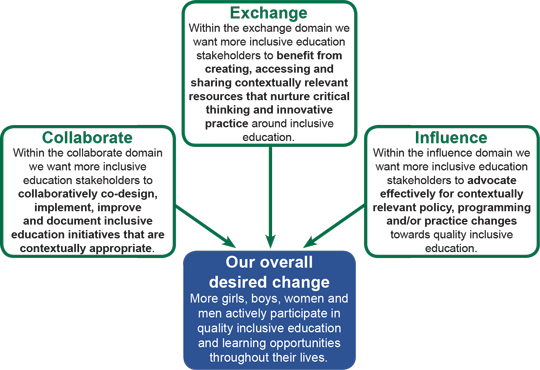Creating a theory of change for EENET
Ingrid Lewis
Our past
EENET was started in 1997. It was created to fill a gap. In the 1990s, there was a growing amount of information about inclusive education, mostly written in or about ‘developed’ countries: UK, Europe, USA, Australia. Such information was often not relevant or useful for those interested in supporting inclusive education in ‘developing’ countries. There was also a lot of experience evolving in these ‘developing’ countries, which was often not documented, shared or learned from, either locally or internationally.
EENET’s remit, from day one until now, has therefore been to support grassroots education stakeholders in ‘developing’ countries to document and share their experiences and ideas around inclusive education. We focus on ensuring the least heard stakeholders have a voice and have access to free, easy-to-read information.
Changing global context
Since 1997, there have been lots of changes to the world in which we work. Information on inclusive education – in both ‘developed’ and ‘developing’ countries – is no longer in short supply. Indeed, sometimes there is an overload of materials. This creates new challenges for education stakeholders: how does one select the most useful or relevant materials from the huge pile available; and how does one turn the wealth of ideas on paper into actions in reality?
Another big contextual change was the global economic crisis and the squeeze on donor funding. Various information networks, similar to EENET, closed due to lack of funding. In 2009, EENET decided to diversify its funding base by offering consultancy services. Such services would help fund our free information-sharing work, and respond to stakeholder demand for help with ‘turning theory into practice’. The move was debated within EENET. EENET’s original purpose was to facilitate stakeholders to reflect, document, communicate and advocate – rather than for us to get directly involved with projects on the ground. We also sought to ‘swim upstream’ and be critical and challenging. There were concerns about whether we could continue to be sufficiently independent and critical if we were being paid as consultants by those we needed to challenge.
Looking ahead
EENET’s original work as an information network survived the global recession, due in large part to the income from our consultancy work. Our independence and criticality also survived, because all potential consultancies are viewed through an ‘EENET lens’ – we do not take on any work that contradicts our core values and principles, or where we see no scope to influence. Indeed, various consultancy clients have told us that they value the fact that we still challenge and constructively criticique their point of view, as this helps them to improve their work more than a consultant who constantly agrees with them!
Our consultancy work is a successful financial survival strategy, but we need to ensure that it doesn’t overshadow our original information-sharing purpose. During 2016, we therefore sought to better understand the connections between our information-sharing and consultancy work. In doing this, we developed a theory of change to guide our work for the next few years. We used an external consultant to help us think more critically and creatively. We wanted to avoid creating a replica of our previous strategic plan, but without external support it was difficult to know where to start!
The theory of change process revealed how our information-sharing work and our consultancy services all contribute to the same desired changes. (In future if a consultancy project doesn’t contribute to one of our desired changes, then we won’t do it.) The theory of change process encouraged us to see all of EENET’s activities as a whole, rather than perceiving the information-sharing work as the ‘core’ and consultancies as a slightly separate and slightly undesirable activity. In reality, there is no dividing line. All our consultancy work involves information-sharing and/or supporting stakeholders to critically reflect and document. And our information-sharing work benefits greatly from lessons learned during consultancies. Through consultancies we are gathering information about realities on the ground that we didn’t have access to before.
The theory of change process also encouraged us to reflect more critically on why we do our activities, and how we think our relatively small-scale work contributes to longer-term, larger-scale changes. After nearly 20 years, it was very useful to step back and critically reflect on why we publish Enabling Education Review, and what bigger changes we hope it will contribute towards.
Our desired changes
We identified the overall change that we want all EENET’s work to contribute towards: a world in which more girls, boys, women and men actively participate in quality inclusive education and learning opportunities throughout their lives. This is a huge change; we do not expect to achieve this change by ourselves, but we will continuously contribute our efforts towards it.
There are many smaller changes that need to happen on the path towards this overall desired change. We identified three main ‘domains’ or areas of change that EENET is best placed to focus on: exchange, collaborate and influence.
All our information-sharing and consultancy work will be planned and monitored around these three domains of change. Of course, many more smaller changes are needed to achieve our exchange, collaborate and influence goals. We have mapped these smaller changes or steps in three ‘pathways of change’ diagrams. Please contact EENET if you would like to see these more detailed diagrams.
Our next step is to develop a simple documenting and monitoring tool to help all EENET volunteers, consultants, members and directors critically reflect on whether and how our work is contributing to the small and large changes we have mapped in the theory of change diagrams. We will try to document these in short case studies to share in future editions of Enabling Education Review.
Ingrid is Managing Director of EENET CIC.
Email: ingridlewis@eenet.org.uk

